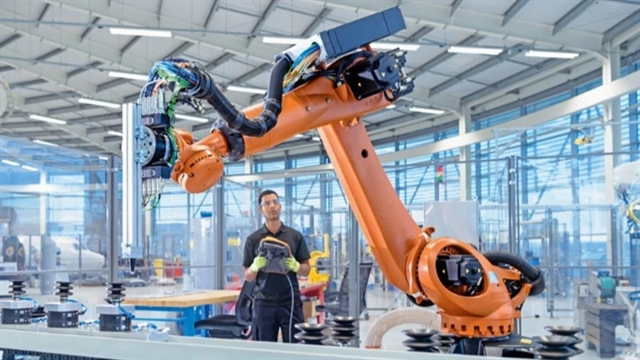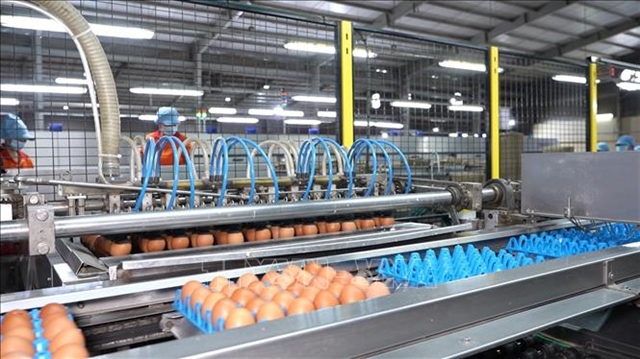 Economy
Economy


|
| Automation helps Vietnamese enterprises enhance competitiveness. — Photo nhandan.vn |
HCM CITY — As the country’s largest industrial and service hub, HCM City is now spearheading policies that foster digital transformation, automation and artificial intelligence (AI) adoption in production.
These efforts, combined with national strategies, are creating favourable conditions for enterprises to invest in advanced technologies, enhance competitiveness, and meet global supply chain standards.
Việt Nam’s mechanical and manufacturing sector is entering a new stage of modernisation, with growing demand for automation, smart production management, and international connectivity.
According to Đỗ Phước Tống, chairman of the HCM City Association of Mechanical – Electrical Enterprises (HAMEE), by September 2025, Việt Nam’s mechanical and manufacturing industry had shown clear signs of recovery and posted impressive growth.
He emphasised that the sector is now at a crucial turning point where technological renewal, automation and digitalisation are no longer optional, but prerequisites for survival and expansion abroad.
The industry currently focuses on three major segments: motorbikes and spare parts, household mechanical products, and automobiles with related components, which together account for about 70 per cent of domestic production value.
These fields also enjoy strong demand and steady growth in the domestic market.
“To ensure that Việt Nam’s mechanical industry truly advances, support must come from multiple directions – associations, authorities, international partners – but most importantly from the determination of enterprises themselves. One of HAMEE’s key missions is to highlight the value of Vietnamese industrial products, promote the use of goods made by our own people, and gradually build trust among international customers,” Tống said.
Nguyễn Bá Tòng, vice chairman and southern representative of the Việt Nam Association for Supporting Industries (VASI), noted that despite remarkable growth, Việt Nam’s supporting industries still face many challenges.
Most enterprises are small and medium-sized, with limited technology and management capacity.
Their ability to meet international standards remains uneven, leading to a localisation rate in sectors such as automobiles that is still lower than national targets.
Only about 17 per cent of domestic firms have joined the supply chains of multinational corporations.
He stressed that building platforms and forums to help Vietnamese enterprises gain access to technology, enhance production capacity, and connect with global partners is now more urgent than ever.
Role in the industrial hub
In HCM City, the industrial and construction sector continues to play a leading role, with the city’s Index of Industrial Production (IIP) recording the highest growth in recent years.
Since early 2025, the city’s manufacturing industry has regained its momentum, reaffirming its position as the southern hub of both industry and services.
Cao Thị Phi Vân, deputy director of the Investment and Trade Promotion Centre (ITPC), explained that mechanical engineering holds particular importance, as it supplies machinery, equipment and foundational solutions for the entire production chain.
She pointed out that in 2025, the industry faces opportunities and challenges from global trends such as AI, automation, green transition and the circular economy.
To stay competitive, the sector must accelerate technology adoption, improve productivity and quality, and meet increasingly stringent international requirements.
Enterprises in the city also underlined the importance of preferential credit policies, digital transformation support, training for high-quality human resources and national e-commerce standards.
They believe that these measures will act as catalysts for growth, while coordination between distributors, technology firms, associations and regulatory bodies will form a “brand alliance”, ensuring Vietnamese products are safeguarded and developed sustainably.

|
| An egg sorting line with an automated system and UV sterilisation at a Vietnamese enterprise’s factory. — VNA/VNS Photo |
Digital transformation momentum
Several domestic companies have already established AI application centres for research, development and logistics, using smart technology for routing and marketing.
A survey released by Synology in 2025 showed that nearly 90 per cent of enterprises in Southeast Asia have invested in digital transformation.
However, 85 per cent remain at the initial stage, while over 55 per cent have experienced cyberattacks, and only one-fifth trust their ability to recover fully from such incidents.
Jola Lê, business manager of Synology Việt Nam, said that enterprises now have broader solution options to meet diverse demands.
“Cyber resilience has become a top priority for IT leaders, directly determining business continuity and competitiveness. Synology’s expanded portfolio provides simple, flexible and secure solutions, helping enterprises protect their most valuable assets and pursue sustainable growth in the digital era,” she said. — VNS




